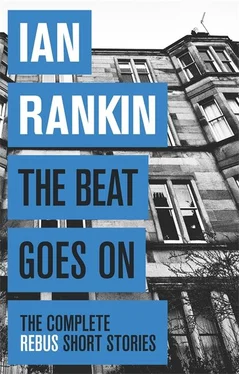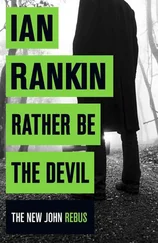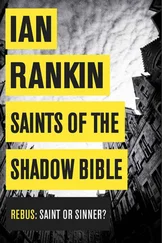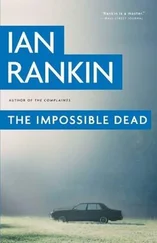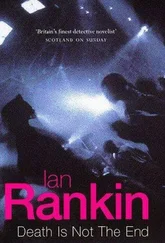The hall’s pastel colour scheme extended to the living-room and bedroom. Mute colours, subtle and warming. There was nothing subtle about the blood though. The blood was copious. Moira Bitter lay sprawled across her bed, her chest a riot of colour. She was wearing apple-green pyjamas, and her hair was silky blonde. The police pathologist was examining her head.
‘She’s been dead about three hours,’ he informed Rebus. ‘Stabbed three or four times with a small sharp instrument, which, for the sake of convenience, I’m going to term a knife. I’ll examine her properly later on.’
Rebus nodded and turned to MacManus, whose face had a sickly grey tinge to it.
‘Your first time?’ Rebus asked. The constable nodded slowly. ‘Never mind,’ Rebus continued. ‘You never get used to it anyway. Come on.’
He led the constable out of the room and back into the small hallway. ‘This man we’ve arrested, what did you say his name was?’
‘John MacFarlane, sir,’ said the constable, taking deep breaths. ‘He’s the deceased’s boyfriend apparently.’
‘You said he seemed in a state of shock. Was there anything else you noticed?’
The constable frowned, thinking. ‘Such as, sir?’ he said at last.
‘Blood,’ said Rebus coolly. ‘You can’t stab someone in the heat of the moment without getting blood on you.’
MacManus said nothing. Definitely not CID material and perhaps realising it for the very first time. Rebus turned from him and entered the living-room. It was almost neurotically tidy. Magazines and newspapers in their rack beside the sofa. A chrome and glass coffee table bearing nothing more than a clean ashtray and a paperback romance. It could have come straight from an Ideal Home exhibition. No family photographs, no clutter. This was the lair of an individualist. No ties with the past, a present ransacked wholesale from Habitat and Next. There was no evidence of a struggle. No evidence of an encounter of any kind: no glasses or coffee cups. The killer had not loitered, or else had been very tidy about his business.
Rebus went into the kitchen. It, too, was tidy. Cups and plates stacked for drying beside the empty sink. On the draining-board were knives, forks, teaspoons. No murder weapon. There were spots of water in the sink and on the draining-board itself, yet the cutlery and crockery were dry. Rebus found a dishtowel hanging up behind the door and felt it. It was damp. He examined it more closely. There was a small smudge on it. Perhaps gravy or chocolate. Or blood. Someone had dried something recently, but what?
He went to the cutlery drawer and opened it. Inside, amidst the various implements was a short-bladed chopping knife with a heavy black handle. A quality knife, sharp and gleaming. The other items in the drawer were bone dry, but this chopping knife’s wooden handle was damp to the touch. Rebus was in no doubt: he had found his murder weapon.
Clever of MacFarlane though to have cleaned and put away the knife. A cool and calm action. Moira Bitter had been dead three hours. The call to the police station had come an hour ago. What had MacFarlane done during the intervening two hours? Cleaned the flat? Washed and dried the dishes? Rebus looked in the kitchen’s swing-bin, but found no other clues, no broken ornaments, nothing that might hint at a struggle. And if there had been no struggle, if the murderer had gained access to the tenement and to Moira Bitter’s flat without forcing an entry... if all this were true, Moira had known her killer.
Rebus toured the rest of the flat, but found no other clues. Beside the telephone in the hall stood an answering machine. He played the tape, and heard Moira Bitter’s voice.
‘Hello, this is Moira. I’m out, I’m in the bath, or I’m otherwise engaged.’ (A giggle.) ‘Leave a message and I’ll get back to you, unless you sound boring.’
There was only one message. Rebus listened to it, then wound back the tape and listened again.
‘Hello, Moira, it’s John. I got your message. I’m coming over. Hope you’re not “otherwise engaged”. Love you.’
John MacFarlane: Rebus didn’t doubt the identity of the caller. Moira sounded fresh and fancy-free in her message. But did MacFarlane’s response hint at jealousy? Perhaps she had been otherwise engaged when he’d arrived. He lost his temper, blind rage, a knife lying handy. Rebus had seen it before. Most victims knew their attackers. If that were not the case, the police wouldn’t solve so many crimes. It was a blunt fact. You double bolted your door against the psychopath with the chainsaw, only to be stabbed in the back by your lover, husband, son or neighbour.
John MacFarlane was as guilty as hell. They would find blood on his clothes, even if he’d tried cleaning it off. He had stabbed his girlfriend, then calmed down and called in to report the crime, but had grown frightened at the end and had attempted to flee.
The only question left in Rebus’s mind was the why? The why and those missing two hours.
Edinburgh through the night. The occasional taxi rippling across setts and lone shadowy figures slouching home with hands in pockets, shoulders hunched. During the night hours, the sick and the old died peacefully, either at home or in some hospital ward. Two in the morning until four: the dead hours. And then some died horribly, with terror in their eyes. The taxis still rumbled past, the night people kept moving. Rebus let his car idle at traffic lights, missing the change to green, only coming to his senses as amber turned red again. Glasgow Rangers were coming to town on Saturday. There would be casual violence. Rebus felt comfortable with the thought. The worst football hooligan could probably not have stabbed with the same ferocity as Moira Bitter’s killer. Rebus lowered his eyebrows. He was rousing himself to fury, keen for confrontation. Confrontation with the murderer himself.
John MacFarlane was crying as he was led into the interrogation room, where Rebus had made himself look comfortable, cigarette in one hand, coffee in the other. Rebus had expected a lot of things, but not tears.
‘Would you like something to drink?’ he asked. MacFarlane shook his head. He had slumped into the chair on the other side of the desk, his shoulders sagging, head bowed, and the sobs still coming from his throat. He mumbled something.
‘I didn’t catch that,’ said Rebus.
‘I said I didn’t do it,’ MacFarlane answered quietly. ‘How could I do it? I love Moira.’
Rebus noted the present tense. He gestured towards the tape machine on the desk. ‘Do you have any objections to my making a recording of this interview?’ MacFarlane shook his head again. Rebus switched on the machine. He flicked ash from his cigarette onto the floor, sipped his coffee, and waited. Eventually, MacFarlane looked up. His eyes were stinging red. Rebus stared hard into those eyes, but still said nothing. MacFarlane seemed to be calming. Seemed, too, to know what was expected of him. He asked for a cigarette, was given one, and started to speak.
‘I’d been out in my car. Just driving, thinking.’
Rebus interrupted him. ‘What time was this?’
‘Well,’ said MacFarlane, ‘ever since I left work, I suppose. I’m an architect. There’s a competition on just now to design a new art gallery and museum complex in Stirling. Our partnership’s going in for it. We were discussing ideas most of the day, you know, brainstorming.’ He looked up at Rebus again, and Rebus nodded. Brainstorm: now there was an interesting word.
‘And after work,’ MacFarlane continued, ‘I was so fired up I just felt like driving. Going over the different options and plans in my head. Working out which was strongest—’
He broke off, realising perhaps that he was talking in a rush, without thought or caution. He swallowed and inhaled some smoke. Rebus was studying MacFarlane’s clothes. Expensive leather brogues, brown corduroy trousers, a thick white cotton shirt, the kind cricketers wore, open at the neck, a tailor-made tweed jacket. MacFarlane’s 3-Series BMW was parked in the police garage, being searched. His pockets had been emptied, a Liberty print tie confiscated in case he had ideas about hanging himself. His brogues, too, were without their laces, these having been confiscated along with the tie. Rebus had gone through the belongings. A wallet, not exactly bulging with money but containing a fair spread of credit cards. There were more cards, too, in MacFarlane’s personal organiser. Rebus flipped through the diary pages, then turned to the sections for notes and for addresses. MacFarlane seemed to lead a busy but quite normal social life.
Читать дальше
